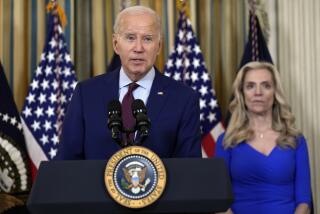Panel Wants Merc to Revamp Some Trading Policies
- Share via
A special committee of the Chicago Mercantile Exchange on Wednesday recommended several sweeping reforms designed to curb trading abuses, increase public confidence and soften attempts by Congress to impose tougher regulations.
The proposed reforms, which must be approved by the exchange’s board of governors, as expected include a partial ban on “dual trading,” the controversial practice whereby brokers trade for their own personal accounts as well as for client accounts, creating a possible conflict of interest.
The proposals also include steps to increase floor surveillance, stiffen penalties for violations of exchange rules, ban certain trading between members of the same broker group and include outsiders on exchange disciplinary committees.
General Praise
The recommendations by the nine-member panel, which includes six individuals who are not members of the Merc, came three months after the committee was formed amid reports that an FBI undercover investigation had found numerous trading abuses at Chicago futures exchanges that may have cheated customers out of millions of dollars.
The reforms appear to be the most sweeping proposed by any futures exchange since news of that FBI probe fueled congressional and public outcries for greater controls on the fast-growing but relatively unregulated markets.
The reforms immediately met with general praise from market experts, regulators and congressional leaders.
“The report reflects the way industry self-regulation is supposed to work, responding in a meaningful way to market situations and issues that arise in the futures trading environment,” Commodity Futures Trading Commission Chairman Wendy Lee Gramm said in a statement.
However, an aide for Rep. Kika de la Garza (D-Tex.), chairman of the House Agriculture Committee, which oversees the futures markets, said the proposed reforms will not derail congressional efforts to explore tougher laws on the markets. The exchanges have successfully fought off repeated attempts to tighten regulation in the past, most recently after the 1987 stock market crash. But new measures are expected to be proposed this year when Congress considers legislation to reauthorize the CFTC.
While De la Garza commended the Merc committee for its effort, “that in no way affects the committee’s responsibility to go forward to look at whether statutes and regulation are adequate to make sure everybody is on a level playing field,” the aide said.
Analysts and industry leaders also stopped short of predicting whether the proposed reforms will be accepted and adopted enthusiastically by the exchange’s board and its broker-dealer members. Added surveillance and other controls will increase costs assessed to members. And although many customers and legislators criticize dual trading for allowing brokers to put their own trades ahead of those of clients, many brokers contend that dual trading is essential to maintain adequate trading volume and member profits.
“The floor doesn’t have much of a choice. They’re not going to like it, but they are going to buy it,” said Thomas A. Russo, a commodities lawyer in New York and frequent Merc critic who currently has litigation pending against the exchange. “Now we have to watch and see how this gets implemented. You can have all the tools in the world, but if you don’t have the will to implement, those tools and rules are useless.”
The Merc committee proposal stops short of banning dual trading completely. Instead, it is prohibited only in more actively traded futures contracts and contract months where the added volume of brokers’ own trades is not needed.
Futures contracts, the principal items traded on futures exchanges, are commitments to buy or sell a certain amount of an item at a certain price at a certain time. Dual trading already has been largely banned for major brokers trading the Merc’s contract on the Standard & Poor’s 500-stock index.
Dual trading, however, will be allowed in less actively traded contracts and when customers give written permission.
Other key recommendations of the panel include:
- Banning members of a broker group from trading for their personal accounts against orders from members of the same broker group. This is designed to reduce conflicts of interest and price manipulation.
- Stiffening penalties for exchange rule violations involving injuries to public customers. The first major offense will bring suspension for six months and the second, permanent expulsion.
- Doubling the number of full-time surveillance staff members and expanding their authority to include immediate inspection of all trading records and orders.
More to Read
Inside the business of entertainment
The Wide Shot brings you news, analysis and insights on everything from streaming wars to production — and what it all means for the future.
You may occasionally receive promotional content from the Los Angeles Times.










